#anastasia the first
Text
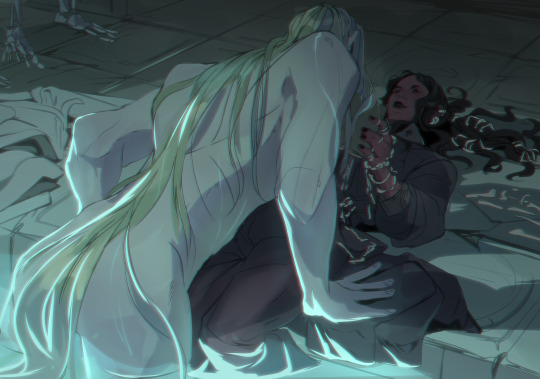
I'm not sure how caption this, just hanging out near the pool
#barbie meets shape of water#idk i still never watched the movie#alecto turned out really huge here but why not#the locked tomb#alecto the ninth#anastasia the first#anastasia the ninth#alectostasia#gideon the ninth#harrow the ninth#nona the ninth#art
6K notes
·
View notes
Text
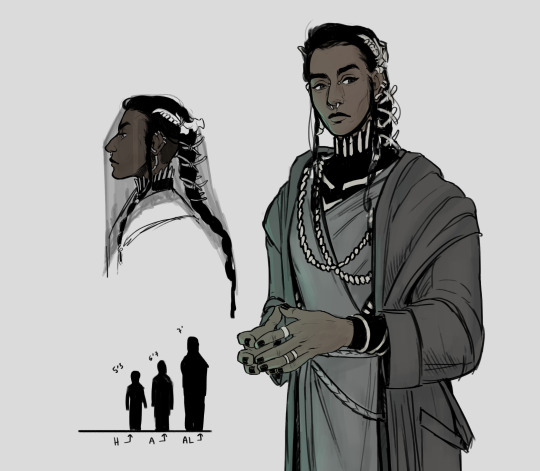
I'm giving Anastasia a try, on the fence
#art#the locked tomb#tlt#anastasia the first#Anastasia the ninth?#She is literally so important to the plot of these books and we get like three sentences of secondhand lore about her
3K notes
·
View notes
Text

She had said, There are almost no beautiful things left. Where is Anastasia? Let me talk to Anastasia.
#the locked tomb#nona the ninth#alecto the first#anastasia the first#tlt anastasia#artists on tumblr#captioned
1K notes
·
View notes
Text
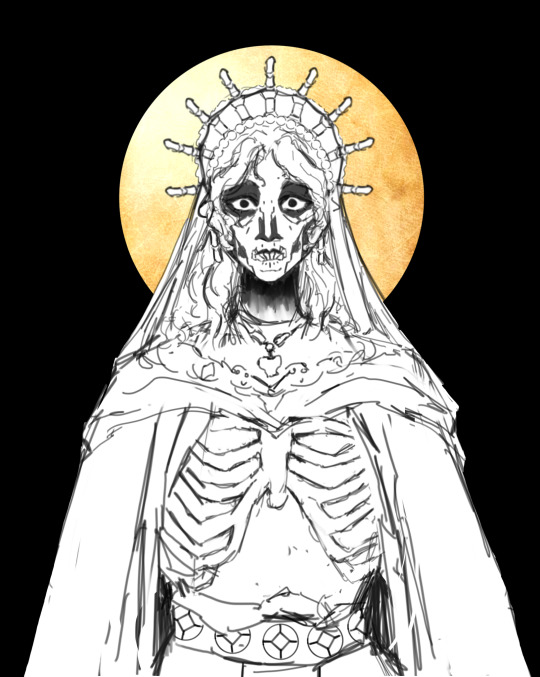
Without paint

Anastasia concept
This is a very messy sketch but oh well
#anastasia the first#anastasia the ninth#tlt#the locked tomb#gideon the ninth#harrow the ninth#nona the ninth#haunting the narrative requires a nice outfit#tlt fanart
2K notes
·
View notes
Text
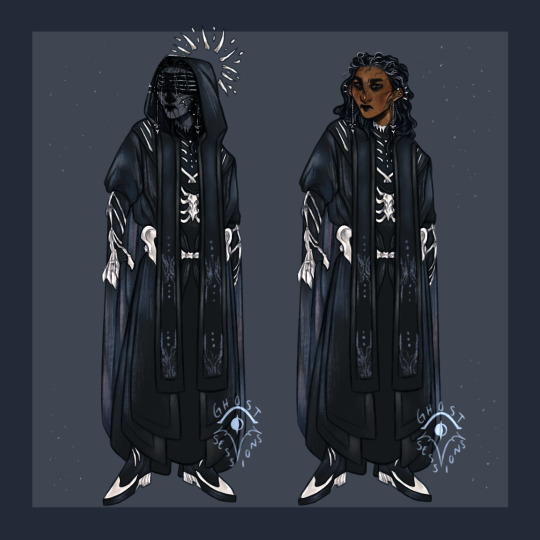
the priestess crushed beneath the new - laid rock.
#artfart#the locked tomb#tlt#the locked tomb trilogy#gideon the ninth#harrow the ninth#nona the ninth#alecto the ninth#anastasia the first#anastasia the ninth#htn spoilers#ntn spoilers#tentatively places her down#been working on her for a handful of days while my wife goes absolutely bonkers over her design in private#LMAO#anyway. my take on anastasia ! wanted to give her a face akin to harrow's but less scrunched#henneyways#enjoy you anastasia enjoyers#tlt anastasia
1K notes
·
View notes
Text

#anastasia the ninth#anastasia the first#alecto the first#alecto the ninth#noctiliart#the locked tomb#fan art#nona the ninth#‘im so sorry about samael’ ;-;#i ship them your honor#i’ve been having a lot of anastasia/alecto thoughts lately#you might have noticed#also after months of painting various blonde women with issues i’ve finally nailed down how to paint blonde hair from imagination#and make it look fluffy#here’s a video bc some of you liked it when i include the progress last time 😘
3K notes
·
View notes
Text
some points. some things. some ideas. none of which are connected, i'm sure.
"anastasia" means "resurrection" or "one who will be reborn."
she is the only one of the original lyctors explicitly stated to have sired her house's line of succession.
this is vitally important (important enough to have been actively preserved against all odds for 10000 years), but nobody seem to quite understand why, including the reverend family.
alecto says "you are the blood of anastasia," as if this is relevant to her. she then kisses harrow and draws blood.
it's only after getting verbal confirmation and (presumably) tasting her blood that she pledges her sword to harrow.
she says "i am sorry about samael," as if that would mean something to harrow, as if she expects harrow to have the same grief over anastasia's cavalier that anastasia did.
the ninth house is "the house of the sewn tongue," which is a ritual for the keeping of secrets. it also sounds oddly flesh magic-ey for the ninth, which means they probably didn't originate the practice.
this would imply that it's relevant to their history somehow.
the ninth's skull is jawless, which we know from the ianthe situation is the way to undo the effects of the sewn tongue.
when people talk portentously of the ninth, they talk about its "secrets" and its "mysteries," always in the plural.
which implies that there are more secrets than just the tomb. i doubt they added the plural after the creche flu, can you imagine? the ninth has other, very old secrets.
harrow loved alecto from sight.
alecto recognized her immediately.
like i said, this is a series of random, unconnected facts. there are no conclusions whatsoever to be drawn from this.
2K notes
·
View notes
Text
My theory on the NtN ending:
Cassiopeia wasn't the only one to betray Jod thousands of years ago. She wasn't the only one to see that what Jod was doing was wrong and put plans in place to deal with it.
Anastasia the first almost had perfect lyctorhood and watched her God kill her cavalier in front of her so she couldn't do it. Maybe she really would have died. Maybe she would have gone the paul route. Maybe she would have survived and Samael would still be around. But he was killed in front of her and she had no say in it.
Alecto was odd, and a little dangerous, but she's the soul of the earth and if Jod could kill the most important person to Anastasia of course he could kill the thing who loved humanity so much she gave them power over life and death.
And when the Lyctors were convincing him to kill his pet revenent beast, the pin point of his greatest sin and a being in constant pain and hurt, maybe Anastasia, the one left behind, the one maybe magicked to silence through a sewn tongue, cursed jaw, felt sympathy and kinship with Alecto. Maybe she knew Jod would never truly kill Alecto. Maybe she was the first person in hundreds if not thousands and millions of years to look at Alecto with compassion and actually say "I will help you if only you tell me how". Maybe she made a promise to protect Alecto, maybe she made a promise to look after her while she sleeps. Maybe she made a promise that one day she'd come and wake Alecto up and they'd solve things together. Maybe one day they can undo what John did and maybe Alecto can have peace, finally, one day. And maybe Alecto swore that for the debt of waking her again she would do anything for Anastasia, any one thing, if Anastasia woke her up in a time when things could change.
But by the time Anastasia, frail with her necromancer build and squirreled away at the edge of the solar system, started reaching old age she realized it was too soon to wake her up. Too soon to send her into the lyctor viper pit again, not while Anastasia was so weak. So she tasks her daughter with guarding the tomb. "This door must stay shut until the day comes when the emperor must die" she says, and her daughter repeats this to her son, and so on and so forth until the body in the locked tomb becomes Armageddon. Not locked away for her own protection, not awaiting the day for the tomb keeper to wake her up and try again, not awaiting the day when the nine houses get to restart. No, she's the greatest enemy of god, she must be locked away lest she start Armageddon, locked away for the protection of the emperor and their duties to her tomb an icon for devotion.
But the bloodwards hold for 10000 years and one day the curse of silence will be lifted from the jaw of the ninth house tomb keeper, and the oath to Alecto is preserved in the Anastasian bloodline. And the daughter of the tomb keeper has awakened the monster once again
#this is me attempting to put a storyteller spin on a hc thats been buzzing around in my skull since i finished ntn#shay posts#tlt#the locked tomb#alecto the ninth#alecto the first#alecto theories#harrowhark nonagesimus#harrow the ninth#gideon the ninth#anastasia the ninth#anastasia the first#nona the ninth#alecto#griddlehark
1K notes
·
View notes
Text
"I’ve already pretty much revealed that Alecto begins with the descent of Christ into Hades."
- Tamsyn Muir
That's right...it's time for more Bible study for fans of weird queer necromancers!
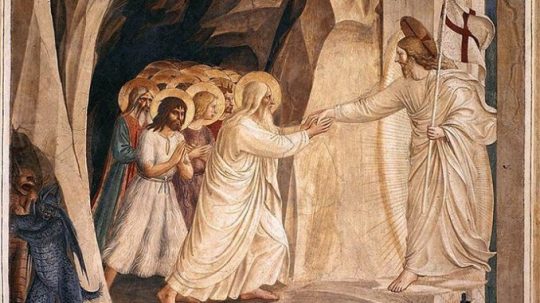
It's currently Holy Week, the week where Western liturgical Christians reenact the events of Jesus' death and resurrection in real time. And today, it's Holy Saturday. So Jesus died on the cross on Good Friday. He rises from the dead on Easter Sunday. But what happened in between? His body lay in the tomb...but his spirit was otherwise preoccupied. Because on Holy Saturday, Jesus went to Hell.
But why would Jesus go to Hell? Because the resurrection was not just about saving the people who came after it - it was a bit more...wibbly wobbly, timey wimey.
To be a bit more specific, he didn't visit Hell Hell. The place Jesus visited isn't Hell in the sense of eternal punishment of the damned, but Hades or Sheol or the Underworld or Limbo - a place for those who were mostly good but lived before Jesus' resurrection had made salvation possible. So before his resurrection, Jesus went to make that salvation retroactive. Particularly, according to tradition, to major figures from the Old Testament, including Adam and Eve.
So Nona the Ninth ended with Harrow walking off into the River in search of theological truth. And Alecto the Ninth apparently begins with Harrow in Hell:
Alecto the Ninth, ACT ONE
HARROW IN HELL
CHAPTER 1
At a point in the slit she was carving through life, Harrowhark Nonagesimus woke to find herself lost in a dark wound. She had been walking when it had all gone black– any path ahead or behind was blotted out; now she was here.
- Tamsyn Muir reading at TorCon
This is riffing heavily on the beginning of Dante's Inferno:
"In the middle of the journey of our life I came to myself within a dark wood where the straight way was lost."
- Dante Alighieri, Inferno
But lots of people go to Hell. What's so special about Harrow going there? Because the traditional name in English for Jesus' chthonic salvation adventures on Holy Saturday is "the Harrowing of Hell." "Harrow" comes from an Old English word meaning to attack or despoil - a very martial way of expressing the idea of Jesus as the victor over sin and death.
Harrow ended NTN realising that she cannot trust John's account of metaphysics. That she needs to discover the reality for herself. The faith of the Nine Houses and John's own styling as god rests on the foundation of the Resurrection - John is the "ransomer of death, scourge of death, vindicator of death", his power is understood to be absolute: "Let the whole of everywhere entrust themselves to him. Let those across the river pledge beyond the tomb to the adept divine."
And yet even that prayer - "let those across the river..." - introduces doubt. Magnus jumps in to silence Abigail when she expresses her heretical belief in the River beyond, and Harrow herself scoffs that "it has been thousands of years since anybody bothered to believe in the River beyond." Abigail believes that John knows nothing about what exists beyond the River. And what about Hell? In HTN, Ulysses the First is described as "languishing in Hell" after his run-in with a Resurrection Beast. John himself describes the stoma as "the mouth to Hell", "a portal to a place I cannot touch - somewhere I don't fully comprehend, where my power and my authority are utterly meaningless."
In the Book of Revelation - the Bible's account of the end of the world - Jesus holds "the keys of death and Hell". John may have resurrected the dead, but he does not comprehend what is beyond it. Both the destination of the good, the River beyond to which the souls of little Isaac and Jean should have traveled lightly after their short and brutal lives, and the Hell that lies beneath the stoma are outside of his power. He is a few keys short of the full divine bunch. He can manipulate death, but he is not really its master.
And so Harrow walks off into the River to look for something or someone she can call god. Harrow, who shares a name with the defeat of death across time and space. Harrow, who is of the unbroken line of Anastasia. Anastasia was kind to Alecto, who like Eve is the mother of all and like Adam walked on the empty earth with god.
In Orthodox icons, the Harrowing of Hell is depicted with Jesus triumphant, leading Adam and Eve by the hand from their tombs. The traditional term for this image is an anastasis, the Greek term for resurrection. Adam and Eve, whose sin broke the intended shape of reality, are restored to wholeness with god.
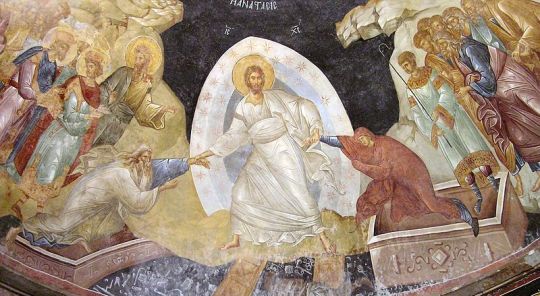
How will Harrow answer her questions about god? What really is beyond the stoma and what would it mean to conquer it? What does it look like, metaphysically, to restore the world of The Locked Tomb to wholeness, and what will it cost?
206 notes
·
View notes
Text
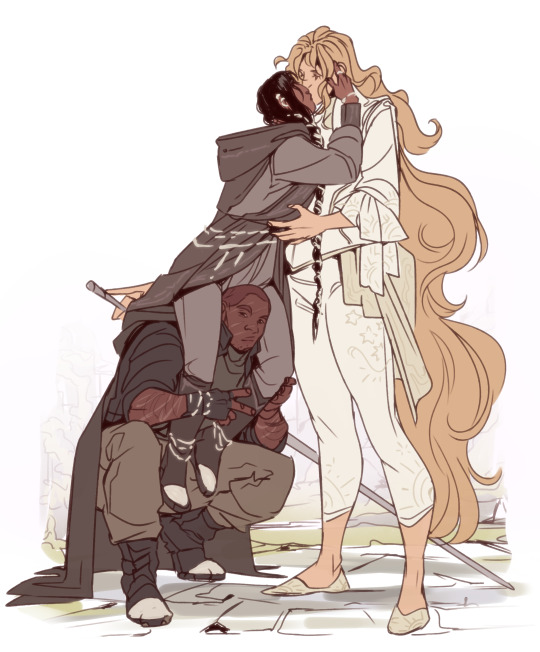
Saint of Duty for sure
#someone talk about them with me I'm going insane#the locked tomb#alecto the ninth#anastasia the first#gideon the first#nona the ninth#anastasia the ninth#harrow the ninth#alectostasia#art
3K notes
·
View notes
Text
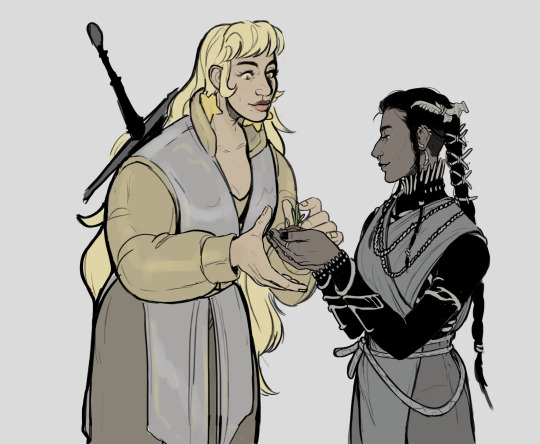
Character doomed by the narrative shows Earth a plant.
#art#the locked tomb#tlt#anastasia#anastasia the first#anastasia the ninth#alecto#alectostasia#Im about to lose control and just draw them making out#they are literally that cheerleader emo girl meme template
1K notes
·
View notes
Text
anastasia and alecto were the original tomb-keeper/tall deranged wet rat blonde duo btw.
#they walked so harryanthe could run#the blueprint#anastasia the first#anastasia the ninth#alecto the first#alecto the ninth#tlt#the locked tomb#harrow the ninth#gideon the ninth#nona the ninth#ianthe tridentarius
376 notes
·
View notes
Text
Anastasia and Pyrrha in the labs.

#the locked tomb#gideon the ninth#harrow the ninth#Nona the ninth#pyrrha dve#anastasia the first#og lyctors
130 notes
·
View notes
Text
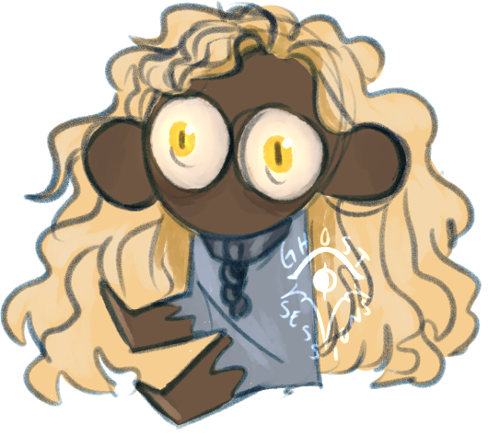
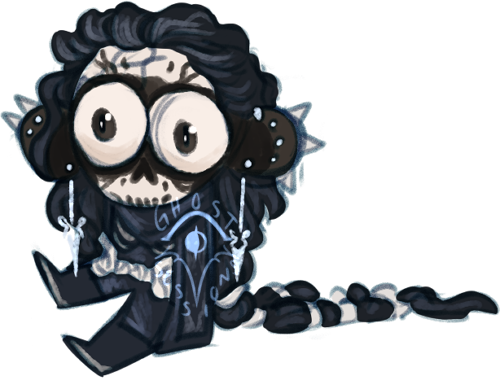
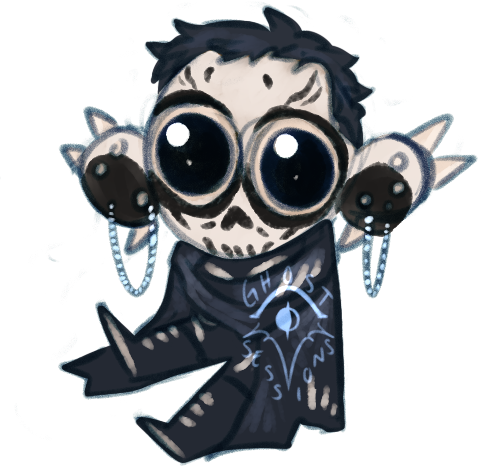
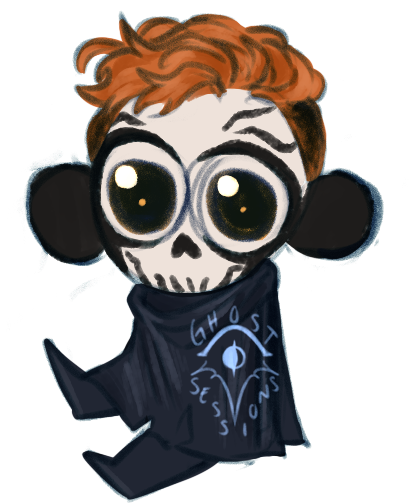
minis for your every need ( inspired by @/civetside )
#artfart#the locked tomb#tlt#the locked tomb trilogy#gideon the ninth#harrow the ninth#nona the ninth#alecto the ninth#harrowhark nonagesimus#gideon nav#alecto the first#alecto tlt#anastasia the first#anastasia the ninth#coughs
701 notes
·
View notes
Text
John, Paul and Perfect Lyctorhood
Here's the thing: I think One Flesh, One End is the wrong way to think about what lyctorhood is, or at least, what it ideally should be.
Think about it: John never had his "cavalier" die for his lyctorhood. And yes, the reason for that is because he tried to consume the Earth's soul and it was too big for one human. But more importantly: this was non-consensual and one way.
Presumably most cavaliers (besides poor Babs) choose to die for their necros, so that's a step in the right direction. And then we have Paul - the death of two people, melding of two souls to create a third. But at the same time Paul didn't really feel like "the best" of Palamedes and Camilla, and mostly felt like a stranger (despite the fact that they clearly have their memories). Maybe they are too new and still have to discover these parts of themself, I don't know but I think we can all agree we didn't like it and I think that's the point. Pyrrha said Paul is not the end but just "a step in the theorem".
Personally, I'm most curious about what Anastasia was doing. According to John, she "freaked out and couldn't get the soul all the way in" and that's why he killed her cavalier, but how reliable of a narrator is John? We know he has a bias and is trying to make himself look better so personally I think that if he isn't outright lying (and we know he's not above that) there's probably more nuance to what he admitted.
So I would like to pose the following theory: Perfect Lyctorhood is not about one person dying for the other, not two people melding into one. Instead it's a process of exchange where both people take a part of the other 's soul in themselves consensually. They are both split and whole at the same time. And I believe (hope) that is what Gideon and Harrow will achieve by the end of the series.
#pyrrha dve#palamedes sextus#camila hect#camilla hect#john gaius#necrolord prime#alecto the ninth#gideon nav#harrowhark nonagesimus#anastasia the ninth#anastasia the first#gideon the ninth#harrow the ninth#nona the ninth#harrow the ninth spoilers#nona the ninth spoilers#htn spoilers#ntn spoilers#the locked tomb#the locked tomb meta#the locked tomb spoilers#tlt spoiles#tlt meta#griddlehark#griddlehark meta#ship: one flesh one end bitch#mine
483 notes
·
View notes
Text
Note: I'm writing this only because I haven't seen anyone else touch on these specific points. I'm not Māori, so my understanding may be mistaken; if so I would be very grateful for correction and elaboration from tangata whenua. (And I've only read Nona once so far, and we all know that's a scratch upon the surface of it.)
Tazmuir has received fandom flack for saying in interviews that Gideon and Harrow are both Māori without mentioning it in the text — which understandably reminds sf/f readers of a certain other author's tendency to dispose of the difficult bits outside the actual work. I think it is clear by now that the reason it wasn't dealt with explicitly earlier on is that Tazmuir sticks religiously (ahem) to the flawed and limited knowledge of her point-of-view characters, and in the Nine Houses they have no concept of pre-Resurrection races and ethnicities, because Jod has not allowed them knowledge of any world but his. (Besides, explaining Gideon's lineage in a Doylist aside would have been rather tricky without revealing, before their proper time in the narrative, juicy details about Jod himself.)
My prediction is that we will find out Anastasia was also Māori. Maybe, probably, from the same iwi as Jod and/or G1deon.
Which makes Harrow, her last descendent, Māori as well.
No matter how many generations separate them. No matter how much other blood.
"Mixed Māori" or "[percentage] Māori" is kind of a pākehā concept. The more important question is, do you whakapapa? Do you know who you are? Do you know where you come from? All it takes is one verified ancestor and you're in the club, no matter how long it's been or what brand of egg carton your skin looks like on the book cover. I think Harrow is descended not just from a line of Tomb-keepers but a line of kaitiaki, guardians of the land, who through Anastasia's private pact with Alecto are sworn to protect her — Papatūānuku, the earth mother born from salt water — and who have been holding on for ten thousand years to right Jod's wrongs. We know salt water is sacred to the line of the Ninth House; we know that Alecto was called "the saltwater creature"; we know that it's Nona's natural element, which calms and renews her; all this links Alecto/Earth specifically with Māori creation myths, more than any others. And we know that preserving the ancient bloodline of the Ninth, Anastasia's bloodline, in Harrow's own improbable and desperately yearned-for person (that Alecto can recognise at a taste), was the goal Pelleamena and Priamhark pursued at the cost of the Ninth House's entire future.
Yes, this series is portraying an indigenous man as the destroyer of Earth. We know that Earth chose him as her saviour and he betrayed her, imprisoned her, set himself up as master of an empire that was her antithesis, then imprisoned her again — arguably worse sins for someone who was born into that special relationship with the land, whom the Earth loved and trusted so much and still loves even now because love past understanding is her gift.
But here's the answer to that. Here's his opposite number. Harrow, who fell in love at first sight with the Earth, who found in that love her reason and her drive to continue living and to hold to her goals through intolerable trauma, who has a unique combination of bloodline and genius and Jod-and-Alecto-derived power (through her Lyctorhood with Kiriona Gaia, wherever that ends up going) with which to fulfill this sacred pact entered into by her tipuna Anastasia.
Harrow being Māori is not a trendy convenient afterthought. It's an integral point.
Harrow knows who she is. She knows where she comes from. She knows where she's going: Hell itself, to get to the bottom of all this shit. So I think we will be hearing more along these lines.
#the locked tomb#nona the ninth#anastasia the first#anastasia the ninth#harrow too#ntn spoilers#nona spoilers#nona the ninth spoilers#acid jail for john#because that is my tag for john
2K notes
·
View notes